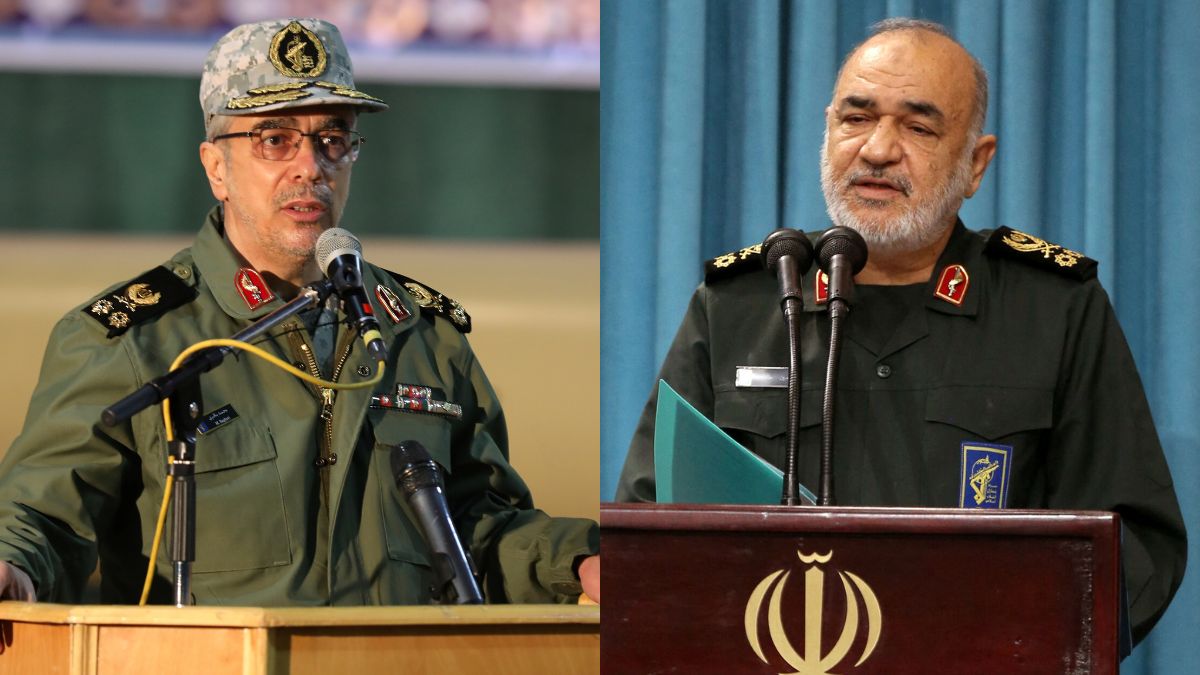Israel carried out large-scale air strikes on Iran on Friday, bringing their long-standing shadow war into open conflict and raising fears of a bigger, more dangerous regional confrontation.
Loud blasts were heard across Tehran after Jerusalem confirmed it had hit Iranian military and nuclear sites.
Catch Israel Attacks Iran Live Updates here.
The strikes led to the deaths of several top Iranian military officials and nuclear experts. Among those killed was Mohammad Bagheri, the second-highest commander after Iran’s supreme leader, Ayatollah Ali Khamenei.
The attack took place as tensions grew over Iran’s nuclear programme, which Israel believes is a serious threat to its survival.
ALSO READ | Oil & gold prices shoot up, flights disrupted: How Israel’s attack on Iran will impact you
So, who were the major leaders killed in Israel’s attack on Iran? Here’s a look at the Iranian military leaders and nuclear scientists who died and what we know about them.
Here’s a look:
Top Iranian leaders killed in Israeli strikes: Who were they?
Mohammad Bagheri
General Mohammad Bagheri served as the chief of staff of Iran’s armed forces and was the second most powerful military figure in the country, ranking just below Supreme Leader Ayatollah Ali Khamenei.
His death, confirmed by Iran’s state broadcaster Press TV, was also acknowledged by the Israel Defense Forces following Friday’s strikes.
Bagheri oversaw both branches of Iran’s military, the regular army (Artesh) and the Islamic Revolutionary Guard Corps, according to the United Against Nuclear Iran group.
He studied engineering and later completed a doctorate in political geography from Tarbiyat-e Modares University.
He had been part of Iran’s military establishment since the 1979 Islamic Revolution.
Hossein Salami
Salami, the commander of the Islamic Revolutionary Guard Corps (IRGC), was the most senior Iranian official killed in the attacks.
As IRGC chief , he reported directly to the country’s supreme leader.
The 65-year-old was known for his strong stance against Israel and the United States.
Since the early 2000s, Salami had been under sanctions by both the United Nations Security Council and the US.
He led the IRGC during key moments, including Iran’s first-ever direct attack on Israel in April and October 2024, when more than 300 drones and missiles were launched.
Just a day before his death, Salami warned that Iran was “fully ready for any scenarios, situations, and circumstances”.
“The enemy thinks it can fight Iran the same way it fights defenceless Palestinians who are under an Israeli siege,” he said, as per BBC. “We are war-tested and experienced.”
ALSO READ | Israel strikes Iran’s nuclear sites, top brass killed: Is West Asia headed for an all-out war?
Gholamali Rashid
Rashid was the deputy commander of the armed forces and headed the Khatam al-Anbia Central Headquarters.
Iran’s Tasnim News Agency reported that Rashid and his son were both killed during the Israeli strikes on Friday.
Ali Shamkhani
Shamkhani was Iran’s former national security chief and a trusted adviser to Supreme Leader Ayatollah Ali Khamenei.
He also represented Tehran during talks that led to the restoration of diplomatic ties with Saudi Arabia.
Shamkhani held the position of national security chief from 2013 for ten years. Before that, he served in senior roles within both the Islamic Revolutionary Guard Corps and the defence ministry.
He was well known in foreign policy circles across Washington and Europe.
He ran for president in 2001 and had previously held influential positions in the IRGC and the defence ministry.
Notably, he remained close to the supreme leader and continued to advise him, including during the period when Iran resumed nuclear talks with the administration of US President Donald Trump.
Fereydoun Abbasi-Davani and Mohammad Mehdi Tehranchi
Nuclear scientists Fereydoun Abbasi-Davani and Mohammad Mehdi Tehranchi also died in the Israeli strikes.
Abbasi had previously headed the Atomic Energy Organisation of Iran and had survived an earlier assassination attempt.
Tehranchi, a theoretical physicist, was also said to be part of Iran’s nuclear weapons programme. He served as president of the Islamic Azad University in Tehran.
In a video released after the strikes, Israeli Prime Minister Benjamin Netanyahu said the operation targeted Iran’s main uranium enrichment site at Natanz, as well as its top nuclear scientists.
Following the strikes, Iran responded by launching around 100 drones toward Israel.
“Iran launched approximately 100 UAVs towards Israeli territory, which we are working to intercept,” Israel’s military spokesman, Brigadier General Effie Defrin, told reporters.
With inputs from agencies
)